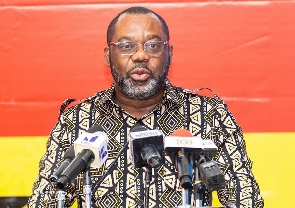Opinions of Wednesday, 14 December 2022
Columnist: Enoch Danso
Ghana’s economic woes to further plummet with bad Genser deal same as financial sector
Workers of the Volta River Authority, Electricity Company of Ghana, GRIDCo and Ghana Gas have expressed dissatisfaction at the government’s plan to sell off a portion of its gas from Jubilee and TEN fields to Genser Energy Ghana Limited (GEGL).
Looking at the current economic situation, it is feared that a change to our energy sector would plunge the country into chaos and furthermore challenges considering what the finance sector is experiencing.
The workers again expressed anger & fear that the Energy Ministry is repeating the same mistakes in the energy sector that led to the current struggles of Tema Oil Refinery which began with the infiltration of private firms in the supply of liquid fuels in the country.
Genser Energy Ghana Limited (GEGL) is a limited liability company registered as a subsidiary of USA based energy solution provider with operations in Ghana, Mali and Guinea. Genser builds, owns and operate electricity market infrastructure to supply power to mines, industries and utilities.
Genser Energy is known to repatriate over 80% of its revenue to South Africa further making its operations less beneficial to the country’s economy. Genser Energy is also responsible for the uptake of over 75% of revenue source for VRA and Gridco in the mining area due to a monopoly of operations recently.
According to them, selling of the gas would mean that Ghana’s potential of having a cheaper gas for fertilizer production will not be materialized.
They expressed that the Jubilee and TEN are the cheapest sources of gas when it comes to the computation of WACOG and that selling a portion of the cheapest gas will result in a higher WACOG.
“This means that if GEGL is allowed to buy a portion of the gas from the Jubilee and TEN fields, the WACOG is likely to increase as compared to the prevailing conditions. It is important to also note that the government’s plan of building a fertilizer plant is also dependent on gas from the Jubilee and TEN fields. Hence, if a portion of gas from the two fields is sold to GEGL, the potential of having a cheaper gas for fertilizer production will not materialize,” they stated in a statement.
The workers' noted that the National Gas Company (GNGC) signed an Interconnection Agreement with Genser Energy Ghana Ltd (GEGL) on 16th February 2018 before executing a Gas Sales Agreement on 20th April 2018 and subsequently, a Gas Pipeline Options Agreement with GEGL was signed on 23rd April 2018.
In this GSA, the custody transfer point of gas was determined to be the Prestea Regulating and Metering Station (PRMS). Gas Supply commenced in May 2019 with pricing pegged at a Delivered Gas Price (DGP) of $7.29/MMBtu. This pricing was in place for months of May and June 2019.
Subsequently, GEGL submitted an amended GSA which was not duly agreed on by both parties. GEGL sought an Industrial Discounted Tariff (IDT) from the Ministry of Energy which was duly granted at $6.5/MMBtu in July 2019. In September 2019, the Public Utilities Regulatory Commission (PURC) reduced the DGP from $7.29/MMBtu to the Weighted Average Cost of Gas (WACOG) of $6.08/MMBtu effective 1st July 2019.
In September 2019, PURC revised the WACOG downwards to $6.0791/MMBtu which was to take effect in retrospect (i.e., from July 2019). It is against this backdrop that GEGL initiated attempts to revert from a Power customer to an Industrial customer. Nevertheless, GEGL has never met the criteria to be aptly classified as an industrial customer. Genser in a letter dated 10th February 2020 notified GNGC of changes in status from an industrial customer to a wholesale supplier of electricity to the unregulated electricity market.
Consequently, GEGL executed a GSA with GNPC in March 2020 and commenced gas offtake from GNPC resulting in the eventual termination of their GSA with GNGC. Concurrently, GEGL disputed GNGC’s invoices based on the delivery point, transmission service charge and the currency denomination of Natural Gas Price.
GNPC per their agreement with GEGL, currently ships gas to GEGL at a total fee of $2.79/MMBtu ($2.66/MMBtu for commodity and $0.134/MMBtu GNPC Aggregation and Management fees) outside of the PURC Approved WACOG. The applicable tariff to Genser is therefore 57% below the approved Discounted Industrial Tariff of $6.50/MMBtu and 54% below the PURC WACOG of $6.0791/MMBtu.
This contradicts the directive from the MOE on the designation of Gas sector institutional roles. The result of this has led to a reduced tariff offered to Genser, below the PURC WACOG and Discounted Industrial Tariff. Clearly, these consistent tariff reductions unfairly granted to GEGL being a wholly private entity are questionable with consequential huge financial losses and liabilities to the state.
Indebtedness to GNGC
As at October 2022, GNGC was still owed USD 13,470,958.79 from invoices before GNPC GSA Execution and USD 17,285,716.75 after. The Gas Value Chain is being negatively impacted by lack of receipts from GEGL. This non-payment affects GNGC’s ability to ensure wholesome payment of regulatory levy due PURC for the period preceding the NGC.
GNGC’s financial ability to run and maintain existing gas infrastructure whilst executing expansion works have been hugely affected. It is worth noting that a shutdown of GNGC’s entire gas infrastructure, as a result of a lack of funds for proper maintenance, could lead to a 75% shortage in the country’s electricity supply.
Indebtedness to Energy Sector
As at October 2022, GNGC was still owed USD 13,470,958.79 from invoices before GNPC GSA Execution and USD 17,285,716.75 after. The Gas Value Chain is being negatively impacted by lack of receipts from GEGL. This non-payment affects GNGC’s ability to ensure wholesome payment of regulatory levy due PURC for the period preceding the NGC. GNGC’s financial ability to run and maintain existing gas infrastructure whilst executing expansion works have been hugely affected. It is worthy to note that a shutdown of GNGC’s entire gas infrastructure, as a result of lack of funds for proper maintenance, could lead to a 75% shortage in the country’s electricity supply.
Indebtedness to Energy Sector
The unauthorized pricing discount granted GEGL leads to a revenue shortfall within the Gas Value Chain. Through this revenue shortfall, the Ministry of Finance is forced to cater for the revenue gap by making payments up to the tune of about USD 45,000,000 as at August 2022.
GNGC has since engaged Economic Sector Recovery Programme (ESRP) Working Group to discuss issues relating GEGL disputing GNGC Tariff, Custody Transfer Point and Non-Payment of Invoices.
It is baffling that the state should incur huge losses with crippling energy sector debts for a private entity to assume the legal mandate of key energy sector entities such as GNGC, VRA, ECG and GRIDCo. This tangential coordinated chain of activities of GEGL is a national security threat with the potential to plunge the energy sector into deep crisis.
However, in July 2022, GEGL announced, through various media platforms, their intention to construct a 100 km Gas Pipeline to Kumasi, a 200 MMScfd Gas Conditioning Plant (GCP) in Prestea as well as a Natural Gas Liquid (NGL) storage terminal at Takoradi Port.
“The actions have devasting and rippling impacts on the Gas Value Chain. The impact will be felt from the Fuel Providers to Power Producers to Ministry of Finance and other stakeholders such as ESRP and PURC.”
According to the workers, GNGC is the only recognized Natural Gas Transmission Utility (NGTU) License holder and GEGL has no mandate to build and operate transmission lines of their own without the knowledge of GNGC.
This act, they said, undermines the effectiveness of GNGC to operate fully as mandated whilst achieving its mission and vision. Again, GEGL as a power-producing company is not supposed to operate a transmission pipeline since it puts VRA in a disadvantageous position.
“Once GEGL combines the operation of the transmission pipeline and power supply to Kumasi, they will monopolize power distribution around the enclave.
Furthermore, the construction of the GCP in Prestea calls into question the source of the gas GEGL would be using for their plant. GNGC anticipates that the GEGL would be seeking to supply gas directly to Independent Power Producers (IPPs). This action would mean GEGL will position itself to be a Power Generator and Distributor hence affecting the efficacy of the Electricity Company of Ghana (ECG) ability to be the premiere electricity supplier in the country and hence affecting their sustainability in the long term.”
It also emerged that with the expansion of business operations to Kumasi, GEGL intends to build its GCP. With their access to gas, GEGL will likely engage the customer base of ECG in the subsequent 2 years.
The proposed transmission pipeline to Kumasi is being built by GEGL without recourse or consultation with GNGC. GNGC, when engaged, proposed a 100-bar-gauge 130km pipeline however GEGL proceeded with a 72-bar-gauge design capacity further compromising GNGC’s role as the NGTU License Owner. Again, a 72-bar-gauge pipe rating defeats the pipe rating provision in the Gas Master plan.
Revenue Losses for VRA and ECG
Genser’s manipulation of the power market has led to a reduction in VRA share of the non-regulated power market. Genser stands to take about 30% of the electricity supply to the mining and industrial companies. As a result, VRA sells majority of its power produced to the regulated power with insufficient revenue recovery. This gap in the energy sector is further widened by Genser’s business activities increasing the bill paid by the Ministry of Finance to cover the sector revenue gap. VRA has lost 50% of their shares in the mines to GEGL. Representing 709.9 million dollars from last year to Q2. of 2022.
Potential Revenue and Job Loss to VRA, GRIDCO, ECG AND GNGC
The expansion of Genser’s activities threatens the long-term survival VRA, ECG, GRIDCO and GNGC.
The potential threat to these four companies spans from increase in labour turnover to revenue losses. Genser’s construction of pipelines for gas supply conflicts with the businesses of VRA, ECG, GRIDCO and GNGC in the supply of gas to non-power industrial customers, conversion of gas into power and transmitting for sales to mining companies without grid charges.
Again, GNGC and VRA is at risk of losing substantial revenue from Genser’s plans to construct a GCP. The illicit replication of the business model of the sole NGTU license owner could be destructive to the entire value chain of the gas sector.
Effect of GCP on GNGC
GEGL intends to build a Gas Conditioning Plant in Pretea. GNGC also intends to build a second Gas Processing Plant with a higher capacity than the existing one. The two plants are expected to take raw gas from the Jubilee and TEN fields.
Currently, these two fields can supply 200MMSCFD of raw gas due to Tullow’s infrastructure constraints. GNGC’s existing GPP has a design capacity of 150MMSCFD, which means that there’s only 50MMSCFD available for any new Gas Processing Plant.
Hence, until Tullow increases their volumes from the two fields, GEGL’s plant and GNGC’s cannot exist concurrently. The President in his state of the nation address indicated that GNGC will be building a new Gas Processing Plant which affirms the need for GNGC’s ongoing process to build a new Gas Processing Plant.
The existing contractual arrangement surrounding GEGL plant indicates that the plant will be taking 50MMSCFD from the Jubilee and TEN fields, whose maximum prevailing output is 200MMSCFD. This leaves 150MMSCFD available and this is the capacity of GNGC’s existing GPP, hence there will not be any need for GNGC’s second GPP. This is the reason why these two plants shouldn’t be built concurrently.
Entertainment












